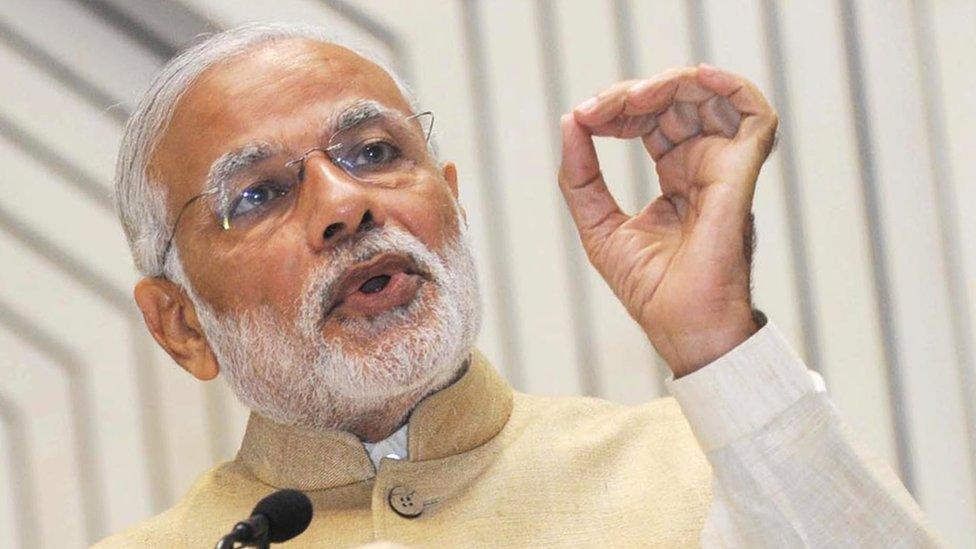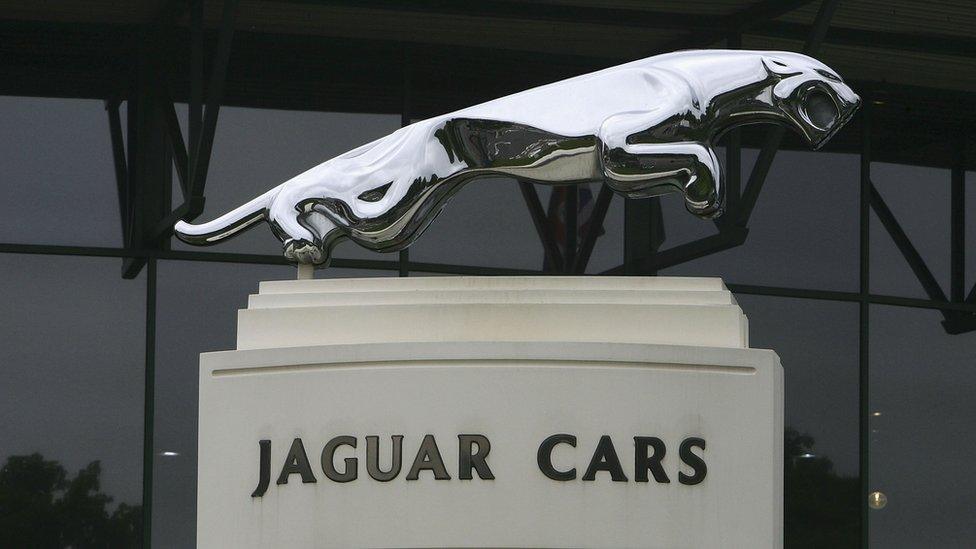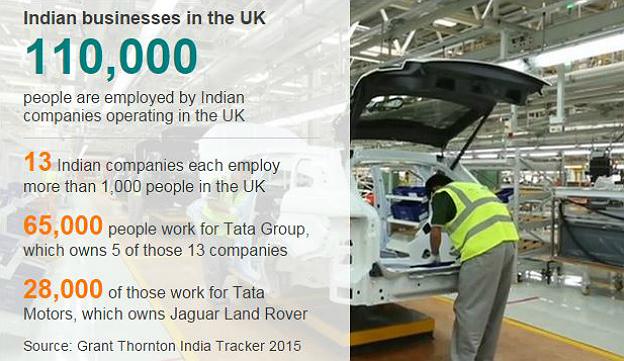Why India is increasing its UK investments
- Published
The trade and investment links between India and the UK
When it comes to Indian investment in the UK, among the most high profile is Tata Motors' ownership of carmaker Jaguar Land Rover.
Yet this is just the tip of an iceberg when it comes to UK firms owned by Indian businesses.
The visit to the UK by Indian Prime Minister Narendra Modi, which starts on Thursday, comes at a time when India is emerging as perhaps the strongest player among the so-called Bric nations - Brazil, Russia, India and China.
While the Brazilian, Chinese and Russian economies are all showing signs of slowing, India is booming.
Shielded from China's slowdown thanks to its huge domestic market, India's economy is growing at a rate of 7% per year, putting it neck and neck with the Chinese.
And some of that Indian growth is finding new markets in the UK.
According to a report earlier this year from government department UK Trade & Investment (UKTI), India is now the third-largest source of foreign direct investment into the UK.
In 2014 alone, investment from India into the UK increased by 64%, and is now almost level with France, the UK's second-largest investor after the US.

Narendra Modi is keen for India to secure more overseas investment
Throughout last year, India invested in 122 projects in the UK, compared with 124 for France and 564 for the US. This meant that Indian investment created 7,730 new UK jobs in 2014, and safeguarded a further 1,620, said UKTI.
Meanwhile, the UK India Business Council, the non-profit body that aims to boost trade and business links between the two countries, estimates that the total value of Indian investment in the UK in the 2013 to 2014 financial year totalled £1.89bn.
Overall there are now more than 800 Indian-owned businesses in the UK, employing more than 110,000 people.
In addition to Tata Motors, Indian IT firms Infosys and Wipro have UK operations. Meanwhile, sister Tata business, Tata Global Beverages, owns best-selling Tetley Tea; and Tata Steel has significant UK operations, despite recently announced job cuts due to falling demand and cheaper steel from China.
'Ease of business'
Alpesh Patel, of London-based private equity business Praefinium Partners, says that while the success of companies such as Tata and Infosys is well known, the quality of Indian small to medium-sized enterprises has improved significantly over the past 10 years, and many are looking to enter EU markets using the UK as their gateway.
He adds that the ease of doing business in the UK, as well as the English language and familiarity with UK institutions, also makes the UK an attractive proposition for Indian investors.
"Ease of business here is often overlooked and taken for granted," says Mr Patel.

Tetley tea is owned by Tata Global Beverages
"We're used to comparing things in absolute terms - we might say it took ages to fill in a tax return for example - but we don't compare it with the same thing in India where it really is a pain."
He adds that one area that particularly appeals to Indian investors is the ease with which they can raise finance in the UK.
"They're often not looking for money from the UK to go into their company in India, but looking for UK money going into their UK operations. We really overlook the size and strength of our angel investor and venture capital community.
"Relative to companies in India, we're seen as an absolute haven in terms of access to capital if you've got a good business."
Joint ventures
Mukesh Rajani, UK India business group leader at accountancy giant PricewaterhouseCoopers, says that besides the EU, the UK's historical connections with the rest of the world, including Africa, are key in attracting Indian investment.
He adds that Indian firms are also keen to tap into British hi-tech expertise.

Tata Motors bought Jaguar and Land Rover from US group Ford in 2008
"Advanced engineering is a big strength for the UK," says Mr Rajani. "High-end engineering, high-end advanced services, high-end pharmaceuticals are very interesting areas for Indian companies.
"Clearly at the high-end what is on offer in Britain is in a different league, and these things would take time for India to develop as it acquires its own talent."
Richard Heald, chief executive at the UK India Business Council, says that most of the investment in the UK is in the IT sectors and driven by Mr Modi's policy of making India the world's hub for IT industries.
He says: "A lot of the growth in indigenous Indian industries has to be sustained through technological development.
"If Modi's policies are to succeed then it needs to have exposure and involvement with a lot of the technological development, incubation, catapult centres, upstream technology companies that we have here.
"The Indians naturally look to us for that in the form of joint ventures, or acquisitions, or just investment."
Mr Heald highlights pharmaceutical firms Piramal and Cipla as two other Indian businesses that have made significant moves into the UK.
Indian businesses in the UK
110,000
people are employed by Indian companies operating in the UK
-
13 Indian companies each employ more than 1,000 people in the UK
-
65,000 people work for Tata Group, which owns 5 of those 13 companies
-
28,000 of those work for Tata Motors, which owns Jaguar Land Rover

'Huge acceleration'
But what about UK investment going into India?
Between 2000 and 2015, the UK invested $22.2bn (£14.5bn) in India, accounting for around 9% of foreign direct investment in the country, according to a report by UK business group the CBI.
This makes the UK the largest foreign investor in India after Singapore and Mauritius.
The CBI study added that in total UK companies are estimated to employ 691,000 people in India. That is 5.5% of the organised private sector workforce.
Mr Heald says: "We estimate that there's been a 300% increase in the number of British companies setting up there in the past 10 years… there's been a huge acceleration.
"And the type of company is changing too - it's more e-commerce, services, IT and education."
Under India's federal system, individual states are now more competitive, and are seeking inbound investment by cutting red tape, and simplifying the country's notoriously arcane state tax systems.
Mr Heald adds: "The term 'competitive federalism' is now being bandied around… these states really have to compete for the investment pound."
- Published11 November 2015